Discover chamomile tea’s magic: calm nerves, improve sleep, and ease digestion. Sip away stress with every soothing cup. Perfect for unwinding!
Ever wondered why a simple cup of chamomile tea is such a cherished staple in the world of herbal remedies? Let’s spill the tea! Chamomile, especially the beloved German and Roman varieties, has been celebrated since ancient times, from the ancient Egyptians to our own cozy kitchens today. This popular herbal tea isn’t just a soothing nighttime brew; it’s packed with benefits that tick all the boxes for boosting mental health, soothing sore throats, and calming anxiety disorder nerves. Imagine curling up with a warm cup of chamomile tea and letting its gentle sedative effects work magic on your jittery nerves and muscle spasms.
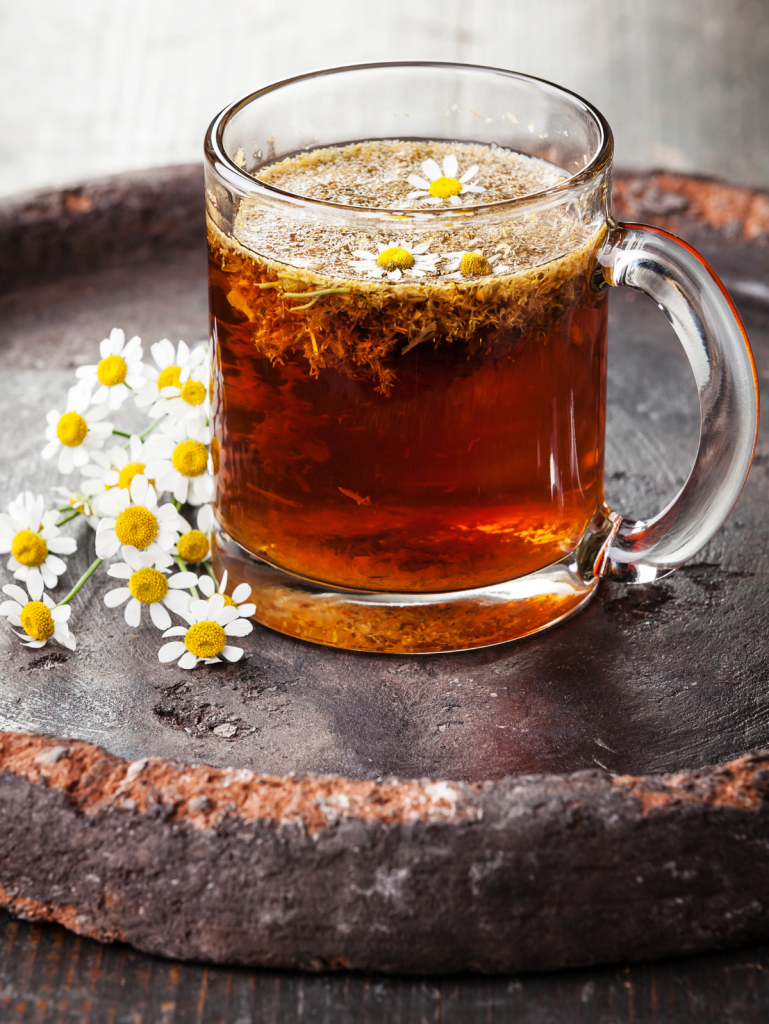
Soothe those menstrual cramps and digestive issues with a flick of your wrist as you sip this kind gift from the Asteraceae family. With its anti-inflammatory properties, chamomile is a superstar for your immune system. And guess what? It might even help with heart health and blood sugar levels. When life’s chaos spikes your blood pressure or sends your digestive tract into a tizzy, peace is just a cup away. Remember, though, always chat with a healthcare provider to dodge any side effects, especially if you’re pairing chamomile with other treatments. Ready to dive deeper into chamomile’s benefits? Keep reading for a cup-ful of wisdom!
What is Chamomile Tea?
Chamomile tea is a soothing brew made from the dried flowers of the chamomile plant, often referred to as a popular herbal tea. This delicate and aromatic infusion is more than just a cup of tea; it’s a drink that’s been cherished since ancient times by cultures around the world, including the Ancient Egyptians. Chamomile tea is celebrated not only for its calming effect but also for its many potential health benefits.

Photo by Simple Soul Photography
Types of Chamomile
There are primarily three types of chamomile that are used in teas and herbal remedies:
- German Chamomile (Matricaria recutita): Known for its anti-inflammatory properties, it’s the superstar in many herbal medicine practices.
- Roman Chamomile (Chamaemelum nobile): This type is often used for its calming effects. It’s like the gentle whisper of a friend on a stressful day.
- English Chamomile: A close cousin, similar in benefits but less common in tea form.
The different types of chamomile, including Roman chamomile, have unique flavors and therapeutic properties, much like how each instrument contributes a distinct sound to an orchestra.
Health Benefits of Chamomile Tea
Chamomile tea is often praised for its wide range of medicinal properties. Some of the potential health benefits include:
- Support for Mental Health: Chamomile has a calming effect that can help soothe the nervous system, making it a natural remedy for those dealing with anxiety disorder or poor sleep quality.
- Digestive Aid: It’s known to ease digestive issues, acting like a gentle massage for your digestive tract.
- Anti-Inflammatory Effects: Thanks to the anti-inflammatory properties of its active compound, chamomile can help reduce chronic inflammation and even muscle spasms.
- Alleviate Menstrual Cramps: Many find relief for menstrual pain through regular consumption of chamomile tea.
How Chamomile Tea is Made
Making a cup of chamomile tea is as easy as pie—or maybe even easier, since there’s no oven required! Here’s a simple way to prepare it:
- Boil water: Bring some hot water to a gentle boil.
- Add chamomile flowers: Place dried chamomile flowers into a teapot or a cup.
- Steep: Pour the boiled water over the flowers and let it steep for about 5 minutes.
- Strain and enjoy: Remove the flowers, and you’ve got yourself a soothing cup of chamomile tea.
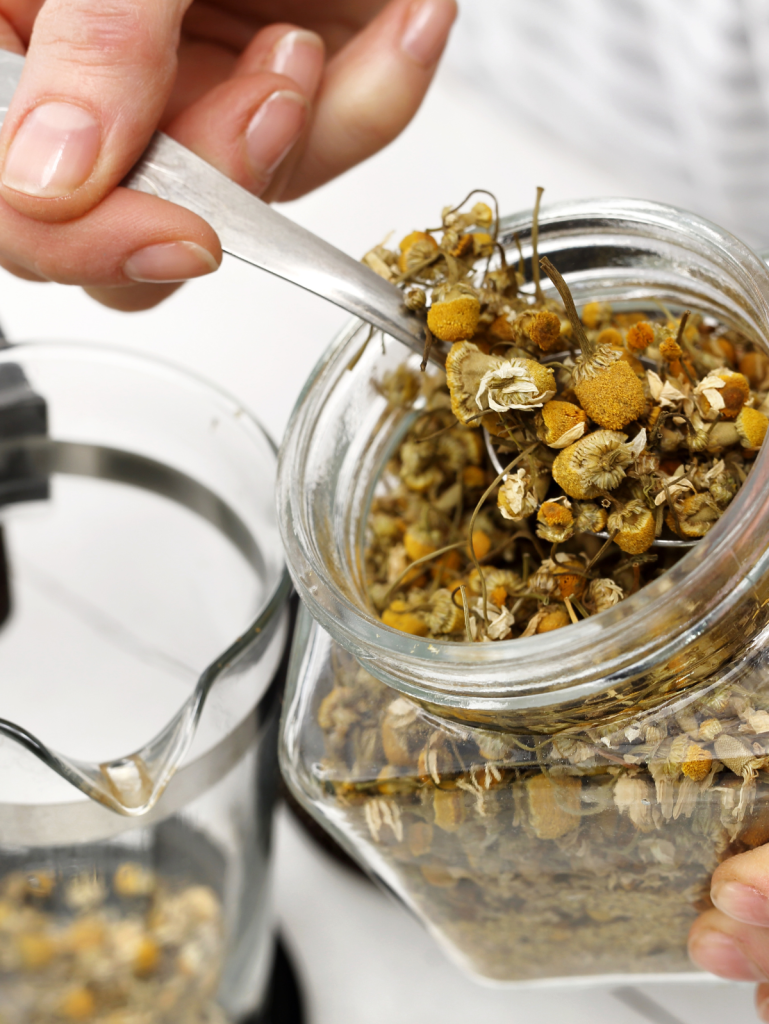
Considerations
While chamomile tea is generally safe for most people, including the young and old along with any healthcare provider approval, there can be side effects. It may cause allergic reactions for those sensitive to other plants in the Asteraceae family. Pregnant women and those on blood thinners should consult their healthcare provider before adding it to their routine.
Chamomile tea isn’t just a drink; it’s a warm hug in a cup, offering a sip of relaxation whenever you need it. Now that we’ve unraveled what chamomile tea is, let’s get ready to explore more about the benefits of drinking chamomile tea in the next section!

Identification of Chamomile
Let’s dive into the world of chamomile, the charming little flower that packs a punch with its benefits for our health. From calming nerves to soothing sore throats, chamomile has been celebrated since ancient times. But how can you spot these famous blooms? Let’s explore.
How to Identify Chamomile
Chamomile comes in two popular varieties: German chamomile (Matricaria recutita) and Roman chamomile (Chamaemelum nobile). While they share similar benefits, they differ in appearance.
Here’s how you can identify them:
- Flowers: Both types of chamomile boast beautiful white petals surrounding a vibrant yellow disc. Imagine a mini sunflower in your garden. These flowers are tiny yet mighty, about the size of a quarter.
- Leaves: Chamomile leaves are delicate and feathery, almost like tiny ferns waving in the breeze. They provide a fresh, apple-like scent reminiscent of a summer orchard.
- Scent: The scent is your biggest clue. Chamomile’s sweet and calming aroma gently whispers of apples and warm summer days, making it easy to identify with a whiff.
While exploring the garden or your local greenery, keep an eye out for these characteristics. Spotting these charming blooms might just beckon you to brew a calming cup of chamomile tea. Whether you’re into herbal remedies or just looking to enjoy the calming effects of a warm drink, identifying chamomile ensures you get the right plant for the cup of magic you’ll soon brew.

Benefits of Drinking Chamomile Tea
Chamomile tea isn’t just any tea; it’s like a warm hug in a mug. Whether you’re sipping it on a cozy night or using it as a way to calm the stormy seas of your day, the benefit of drinking chamomile tea goes beyond just taste. From sleep support, aiding digestion, to boosting mental health, this ancient brew covers it all. So, let’s pour ourselves a cup and explore the perks of this popular herbal tea.
Promotes Better Sleep
Ever struggled to fall asleep, tossing around like a fish on dry land? Chamomile tea might be the answer! Known for its sedative effects, this tea is packed with antioxidants like apigenin. These chemical compounds bind to benzodiazepine receptors in the brain, making you feel more relaxed. In simple terms, consider it nature’s gentle nudge to your nervous system, whispering, “Time to snooze!”
Soothes Digestive Issues
Dealing with a rumbling tummy or the fiery wrath of acid reflux? A cup of chamomile tea can be a soothing companion. Chamomile works magic in calming the digestive tract, thanks to its anti-inflammatory properties. It’s particularly helpful in treating gastritis and, according to a systematic review, can even offer relief for conditions like irritable bowel syndrome (IBS). No more battling those pesky digestive issues!
Supports Mental Health
With the world spinning and anxiety creeping up like a sneaky cat, chamomile tea offers a calming effect that’s hard to beat. Research shows it helps reduce symptoms of anxiety disorder and depression. Imagine chamomile as a soft comfort blanket for your brain, shielding it from stress, and giving mental health the TLC it deserves. Just like a trusted friend, it’s there to support you!
Helps with Menstrual Pain
Menstrual pain is like an uninvited guest. But fear not! Chamomile tea can come to the rescue. Its anti-inflammatory and muscle-relaxing properties work wonders against menstrual cramps. By reducing muscle spasms and improving blood flow, this natural remedy eases discomfort and helps you feel better. So, next time cramps come knocking, try sipping on this soothing brew.
Aids in Bladder Health
For those managing an overactive bladder, chamomile tea could be a helpful ally. By reducing inflammation and soothing irritated tissues, chamomile assists in alleviating bladder discomfort. Its calming nature can help relieve stress-related symptoms, offering a gentle, herbal approach to supporting bladder health. Like a tiny superhero in your teacup, chamomile wears many capes!
By embracing the health benefits of chamomile tea, you’re not just enjoying a delightful drink; you’re inviting an ancient tradition into your modern life. Whether from the dried flowers of german chamomile or the roman chamomile, each cup of chamomile tea brings with it a history of healing and a promise of comfort.
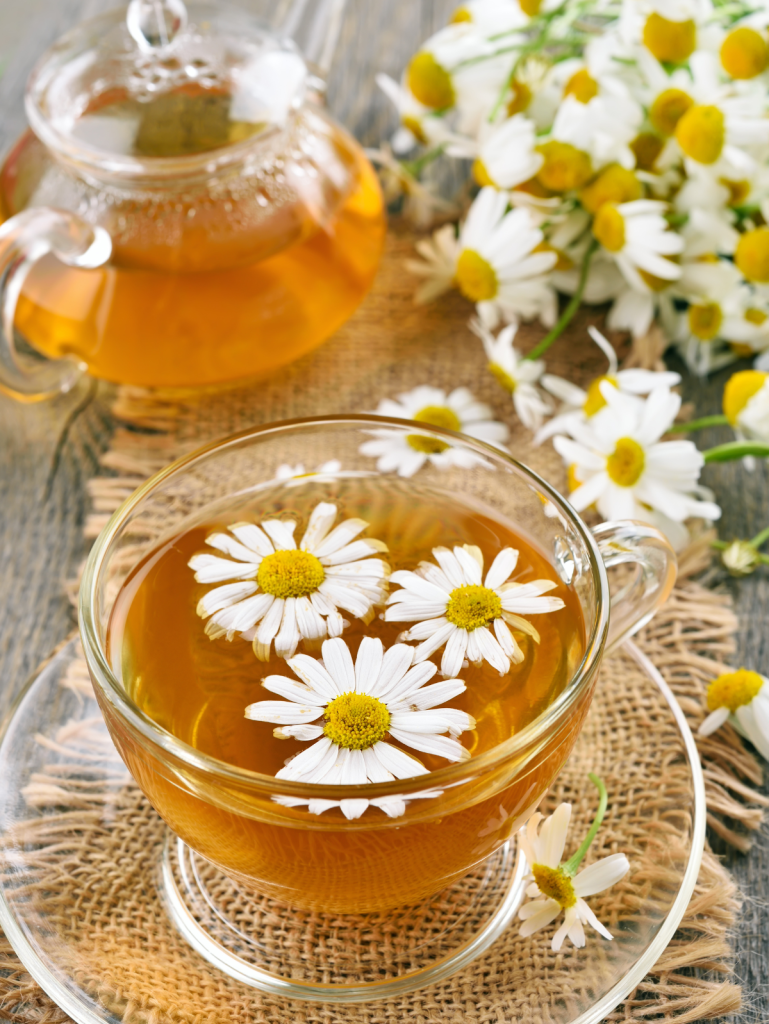
Chamomile Tea and Fasting
When it comes to fasting, your beverage choices can make or break your fast. Among the popular herbal tea options folks often wonder about is chamomile tea. Health benefits of chamomile tea are widely known as it’s a cornerstone in traditional medicine—prized since the days of the Ancient Egyptians. But does this gentle floral brew play nice with fasting?
Does Chamomile Tea Break a Fast?
There’s a lot of chatter about whether a cup of chamomile tea might interrupt the process of fasting. The heart of the issue revolves around how much blood sugar levels and digestive issues can be affected. Typically, fasting aims to boost ketosis, autophagy, or perhaps, weight management. Here’s the scoop:
- Calorie Count: A cup of chamomile tea is calorie-free—a huge plus for fasting.
- Active Compounds: Chamomile boasts chemical properties, but they aren’t known to interfere with fasting benefits like ketosis.
- Health Benefits of Chamomile Tea: Chamomile’s popularity is due to its anti-inflammatory properties that may serve as a natural remedy during fasts.
However, the answer may vary depending on your goals. If your fast is for spiritual or digestive tract reasons, chamomile’s soothing effects could do more good than harm.
How Long Does It Take for Chamomile Tea to Work?
Sipping on a cup of chamomile tea can be like a gentle lullaby for your nervous system. But you might be curious, how soon can you expect the sedative effects to kick in?
- Immediate Comfort: Many people report feeling a calming effect just within minutes, especially if they’re dealing with anxiety disorder or sore throats.
- Sleep Aid: For improving poor sleep quality, drinking before bedtime can show effects within 30 minutes to an hour.
- Digestive Help: Experiencing digestive issues or menstrual cramps? A steaming cup may start alleviating discomfort within the hour.
Chamomile comes from the Asteraceae family and includes roman chamomile and german chamomile. Each has unique nuances, but both offer similar comforts. For those with chronic inflammation, the tea’s antioxidant properties might provide significant improvements over time.
Whenever you sip on a cup of chamomile, think of it as giving your body a soft, reassuring hug. Whether fasting or feasting, this medicinal herb could be a positive effect ticket to tranquility.
Safety and Precautions
When it comes to the benefit of drinking chamomile tea, it’s important to sip wisely! Let’s explore some safety tips and precautions to keep in mind as you indulge in this delightful beverage. Whether you’re a fan of German chamomile, Roman chamomile, or just can’t resist a warm cup of chamomile tea, these insights will ensure you get the best of its soothing properties without any side effects.
Is Chamomile Tea High in Oxalates?
Chamomile tea aficionados, you’re in luck! This popular herbal tea doesn’t pack a punch when it comes to oxalates. Unlike green tea, which may have higher levels, chamomile tea falls into the safe zone for most people. If you’re concerned about kidney stones or oxalate-rich foods, a cup of chamomile tea won’t rock the boat. So feel free to enjoy your calming effect without worrying about unwanted deposits in your kidneys.
Chamomile Tea and Antidepressants
Got an anxiety disorder or taking antidepressants? You might be wondering if chamomile’s benefits mix well with your medication. While chamomile tea is a natural remedy known for its calming effect, it can interact with certain drugs, including blood thinners and some antidepressants. Why? Because chamomile contains chemical compounds that may enhance or interfere with these medications. It’s best to chat with your healthcare provider before sipping your dose of German chamomile if you’re on antidepressants.
Can You Overdose on Chamomile Tea?
Chamomile tea: a cozy companion, but can you have too much of a good thing? It’s rare but possible to experience side effects from drinking too many cups of chamomile tea. Symptoms like nausea, dizziness, or allergic reactions may occur, especially if you’re sensitive to plants in the Asteraceae family. While it feels like a warm hug in a mug, moderation is key. Stick to a safe limit of about 3–4 cups to enjoy its health benefits without feeling under the weather.
Chamomile Tea During Pregnancy
For pregnant women or those breastfeeding, a cup of tea can be a soothing ritual. But is it safe? Chamomile’s benefits during pregnancy are a bit murky. Some healthcare providers suggest skipping it due to its potential to trigger uterine contractions or interact with drugs. Others may say it’s fine in small amounts. Always consult with your healthcare provider before including German chamomile or Roman chamomile in your daily routine during pregnancy or lactation.
Chamomile Tea for Migraines
Migraines—a royal pain indeed! The humble chamomile, with its anti-inflammatory properties, may offer some relief. Think of it as a gentle wave washing over your headache, calming your nervous system. A cup of chamomile tea may help reduce the intensity and frequency of migraines. Its sedative effects can also help soothe mental stress, making it a lovely addition to other herbal remedies for headache relief.
How to Use Chamomile Tea
Chamomile tea is like a hug in a teacup. Want to make the most of it? Let’s explore different ways to incorporate this beloved brew into your daily routine. Whether you wish to savor it as a relaxing nighttime drink or use it for its medicinal properties, chamomile tea can fit right into your lifestyle.
Brewing Your Perfect Cup
Creating your own cup of chamomile tea is as easy as pie—and it might even help with that post-pie digestive feeling! Here’s a no-fuss guide to get you started:
- Boil Water: Use fresh and filtered water for the best flavor.
- Add Chamomile: You can use dried flowers of the chamomile plant or tea bags. German chamomile or Roman chamomile—whichever tickles your fancy.
- Steep: Let it steep for 5-10 minutes. This allows those powerful anti-inflammatory properties to infuse into your tea.
- Strain & Sip: Remove the tea bag or strain the flowers. Enjoy your herbal medicine!
Pro tip: Add raw honey or a slice of lemon for a zesty punch against sore throats.
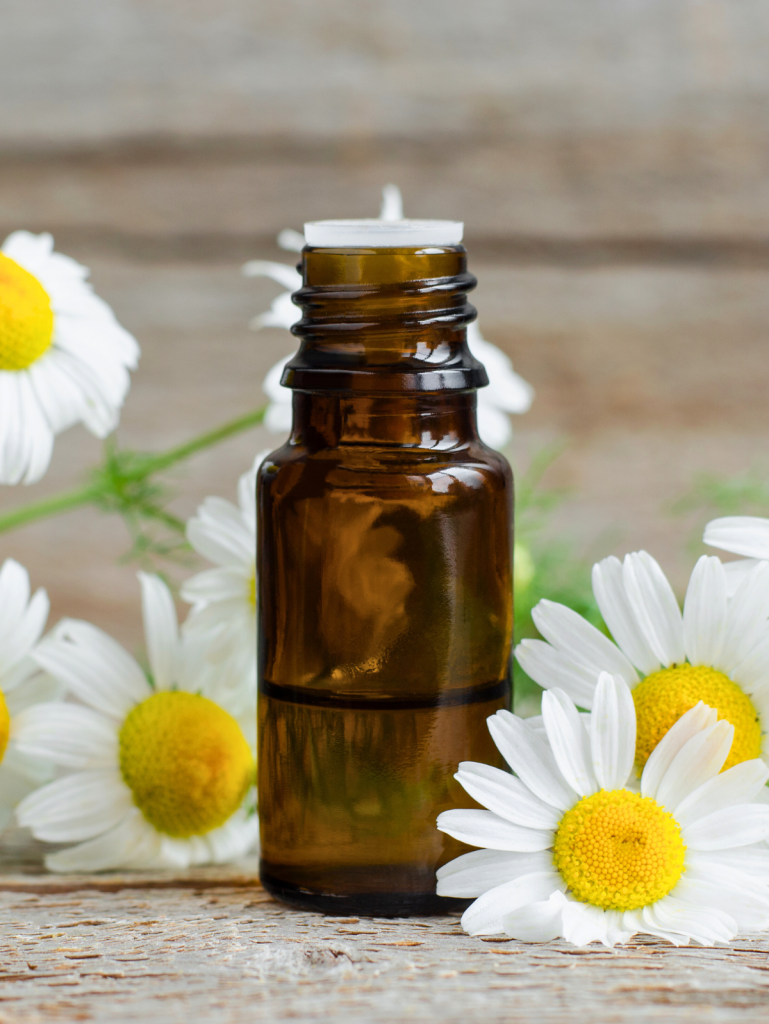
Exploring Different Forms
Did you know you can also use chamomile in other forms besides tea? Let’s shake things up a bit!
- Essential Oil: Chamomile essential oil is a popular choice for skin irritations. A natural remedy for inflamed skin, just like the ancient Egyptians would have loved.
- Chamomile Extract & Supplements: These are great if you’re on the go. They pack the same benefits into a convenient form.
- Capsule Form: For those who prefer popping a pill, chamomile supplements offer the same calming effect without the brew.
Consider consulting a healthcare provider before starting any new supplement to avoid potential side effects like allergic reactions.
You can easily grow your own chamomile in your back yard. Start with seeds or get started chamomile plants to reap your harvest sooner.
Using Chamomile for Health Conditions
From menstrual cramps to digestive issues, chamomile is a champion.
- Sleep Disorders & Anxiety: Its sedative effects can help tackle poor sleep quality and mental health issues like an anxiety disorder.
- Digestive Tract Woes: It can calm muscle spasms and soothe the digestive tract.
- Skin & Sore Throats: Chamomile can also be a go-to for a sore throat relief and to soothe skin irritations.
As you experiment with these different uses, keep in mind that the benefit of drinking chamomile tea goes beyond just a warm drink. Creating your very own cup of tea routine can be both a fun and health-boosting journey.
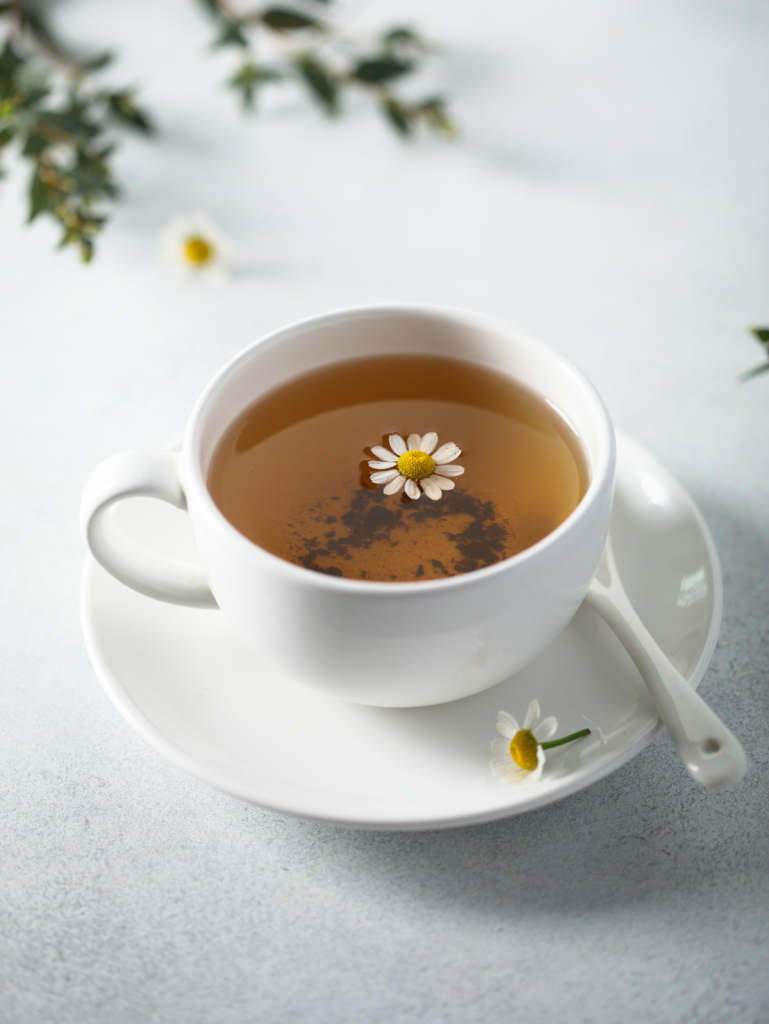
A Calming Sip of Health
Imagine sitting back with a warm cup of chamomile tea, breathing in its sweet, apple-like aroma, and letting it whisk you away to a place of calm. This soothing brew has been used since ancient times, dating back to the ancient Egyptians and their love for herbal remedies. It’s not just any tea; it’s a blend of nature’s best medicinal herb, offering a bounty of potential health benefits. Let’s explore why chamomile deserves a spot in your tea collection.
Naturally Soothing
Chamomile is the tea world’s equivalent of a warm, comforting hug. Sipping on a cup of chamomile tea can provide a gentle calming effect that helps ease the mind and relax the body. This natural trendsetter touches the nervous system softly, often offering relief for those with anxiety disorder or sleep disorders.
A Hot Cup of Health Benefits
You might find it fascinating how a simple cup of tea can pack a punch of medicinal properties. Here’s a taste of what chamomile brings to the table:
- Anti-inflammatory Properties: German chamomile and roman chamomile varieties are celebrated for their anti-inflammatory effects, helping soothe skin irritations and muscle spasms.
- Digestive Boost: Chamomile works wonders for the digestive tract and can aid in alleviating digestive issues like irritable bowel syndrome.
- Heart Health: Regularly enjoying a cup of chamomile tea might support heart health by maintaining normal cholesterol levels and reducing the risk of heart disease.
A Handy Antioxidant
Chamomile’s benefits don’t stop there. This popular herbal tea is a rich source of antioxidant properties, helping to combat free radicals and reduce oxidative stress. A systematic review suggests this might even play a role in reducing risk factors related to chronic diseases and cancer cells.
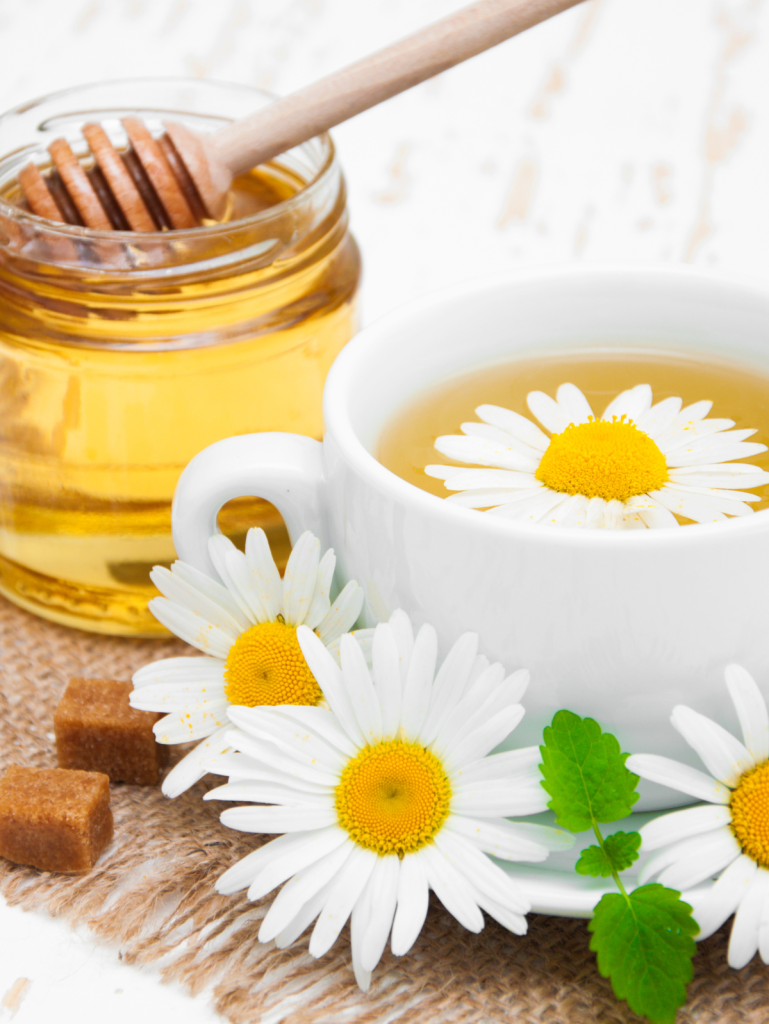





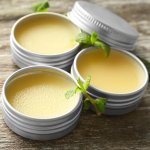




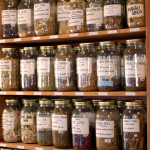
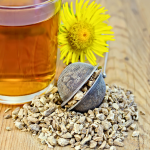

Leave a Reply